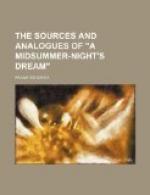[15] l. 43. See pp. 46-7 and note.
[16] l. 45. But-if, unless.
[17] l. 48. For an elaborate investigation of the circumstances concerning the Eildon tree, see the special section in Murray’s edition.
[18] l. 49. rathely, quickly.
[19] l. 63. fee, beasts, cattle.
[20] l. 71. sekerly, truly.
[21] l. 79. ware, worse.
[22] l. 86. byrde, bride.
[23] l. 89. stead, place.
[24] l. 98. duleful, painful.
[25] l. 103. gone = go (old infinitive).
[26] l. 104. Middle-earth = Earth, the middle region in the old Northern cosmogony.
[27] l. 107. Thomas is here addressing the Virgin.
[28] l. 111. beteach, entrust, hand over to.
[29] l. 114. derne, secret.
[30] l. 117. mountenance, space.
[31] l. 121. herbere, garden.
[32] l. 126. bigging, building.
[33] l. 127. papejoys, popinjays, parrots.
[34] ll. 131-6. On the danger of eating fairy apples, see p. 53.
[35] l. 137. hight, command.
[36] l. 141. hight (MS. hye), ? pleasure.
[37] l. 143. pay, please.
[38] l. 145 et sqq. See p. 46.
[39] l. 145. fair, pronounced as two syllables.
[40] l. 150. rise, brushwood, undergrowth.
[41] l. 155. teen and tray, pain and trouble.
[42] l. 167. me were lever, I had rather.
[43] l. 168. Or that, ere that, before that.
[44] l. 175. dess, dais.
[45] l. 183. main and mood, might and main.
[46] l. 188. kneeland = kneeling. Cf. l. 191.
[47] l. 189. fand, found.
[48] l. 190. sawtery = psaltery.
[49] l. 191. ribib, rebeck, lute.
[50] l. 191. gangand = going.
[51] l. 196. store, plentiful.
[52] l. 199. brittened = brittled, cut up (the deer)
[53] l. 208. This sudden and momentary change to the first person is found in all the older MSS. See p. 47.
[54] l. 209. thee buse—it behoves thee. Cf. l. 234.
[55] l. 213. cheer, look, face.
[56] ll. 219-24. See p. 54; also Sir Walter Scott’s introduction to the ballad of The Young Tamlane, in The Minstrelsy of the Scottish Border.
[57] l. 220. skill, reason.
[58] l. 221. To-morn, in the morning.
[59] l. 223. hend, noble, mighty.
[60] l. 226. hethen = hence. Cf. sithen = since.
[61] l. 228. rede, advise.
[62] l. 232. Four lines of the MSS. omitted here.
[63] l. 234. buse. See note on l. 209.




